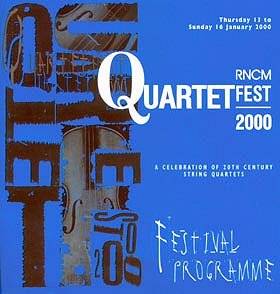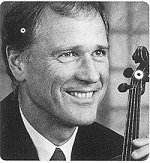
Described as a Millennium quartet party by Christopher Rowland, its artistic Director and Head of Chamber Music at the Royal Northern College of Music, the aim of this four-day festival was to celebrate the quartet genre from the century in which all of us were born.
It was an impressive affair, with events running right through from 9am to 11pm each day. Managing to attend on three of the four days, I was struck immediately by the enthusiasm of all involved and by how Christopher Rowland and his team had set themselves a daunting task!
We were treated to a very wide range of performers. In fact, everyone seemed to be represented from international quartets - the Arditti, members of the BBC Philharmonic and Manchester's own Hallé orchestras, representatives from all of the UK's specialist music schools, amateur quartets from the Manchester community and nearly forty quartets from RNCM's prize-winning chamber music class. Many top British quartets, including the Duke, Bingham, Sorrel, Deakin, Kreutzer and Fitzwilliam Quartets, were also present, performing and giving masterclasses.
Each of the quartets from Britain's specialist music schools presented a work by an established composer and the première of a work by a fellow student. These new works were then discussed in a lively workshop environment where the young composers - the youngest being just sixteen - had the opportunity to receive some valuable advice from well-known RNCM composers Anthony Gilbert and Edward Gregson and the chance to hear their works performed a second time. This was an excellent idea and one that worked well. It is simply not enough to train these young musicians to a professional standard without addressing new music composed by their contemporaries.
On Friday lunchtime we experienced some fine playing by three young quartets, the Grosvenor from St Mary's School, the Sonoré from the Royal Scottish Academy of Music and Drama and the Alexanian from The Purcell School. Although the first of these ensembles had formed only last September, their performance of Quartet No.2 by Hannah Given-Wilson was assured and lyrical. The more established Sonoré followed with a determined performance of Graft, a fine new work by the young Irish composer David Fennessy. The Alexanian quartet chose the relatively early, yet popular, Hindemith No. 3.
As a composer myself, I had hoped to get to a lecture entitled Frontiers of Quartet Technique presented by the composer, musician and lecturer Duncan Druce. Much to my disappointment, this was scheduled to run concurrently with the concert above. Unfortunately, this happened on several occasions over the weekend; people often found themselves having to choose between lectures and concerts where each were potentially interesting and valuable.

At the pre-concert talk presented by Christopher Rowland
before a performance by the Bingham Quartet, we were
briefly introduced to some of the ideas
behind George
Crumb's excellent piece Black Angels.
Rowland is a natural speaker, full of facts and humour and an appropriate
choice for these relatively informal sessions that preceded each evening
concert.
The Bingham Quartet is one of the finest in Britain today, with a strong commitment to the commissioning and performance of new music. Their performance of a varied programme that spanned most of the twentieth century was confident and impressive. The Binghams were assured in their execution of the very different musical styles of Bartok, Stravinsky, Crumb, Glass and Anthony Gilbert. The absolute highlight for me had to be the performance of Black Angels. Composed in the late sixties, Crumb wrote
this fascinating work for an amplified string quartet, requiring the players also to play maracas, tam-tams, water-tuned crystal goblets and make various vocal sounds. As Stephen Bingham led the audience through the assembled 'extras' I began to realise how much of the weekend's repertoire was composed for the quartet 'proper' and how refreshing/necessary was this work to demonstrate wider possibilities!
Sunday morning began bright and early with a composers workshop led by Edward Gregson, the RNCM's Principal. We heard three new works by composers representing the Birmingham Conservatoire, the Royal College of Music and the Guildhall. The third work, Morphing by Francesco Antonioni, proved a popular choice with its 'morphing' of musical quotes from Beethoven, Bartok and Berg.
The Yehudi Menuhin School Quartet opened the lunchtime concert with a piece by one of their fellow students, Michal Monoszon. Unfortunately this was followed by a performance of Gorecki's second quartet - what a dirge! As these young musicians did not seem fully to inhabit his world either, the resulting performance was poor. The two student quartets that followed - both from Manchester's Chetham School - managed considerably better with a promising student piece by Saskia Bladt and Britten's third quartet. Glancing through their biographies, I noted that many of the young musicians appeared to have moved to Britain at a very young age to pursue their studies at the highest level; overall the standard is staggeringly good. One can't help to be impressed by their individual and collective musical achievements to date.
The RNCM's Quartetfest was an ambitious and successful undertaking, one that may prove pivotal in the development of young string players and composers. At the very least it was a chance to enjoy, in the words of Christopher Rowland, a metaphorical quartet knees-up together!
Ailís Ní Ríain
 Return to:
Return to: